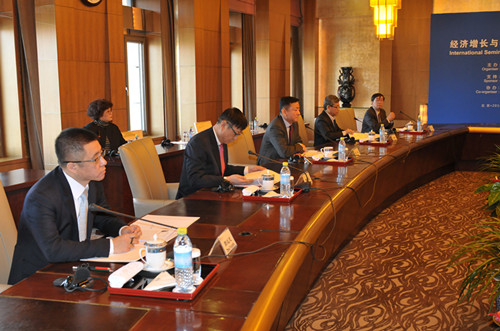
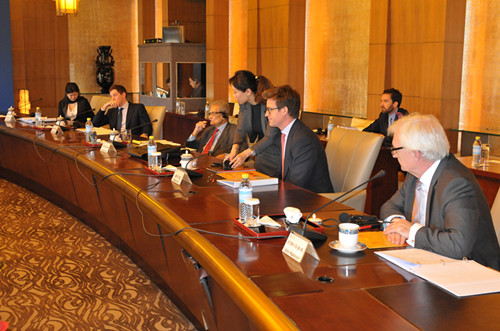
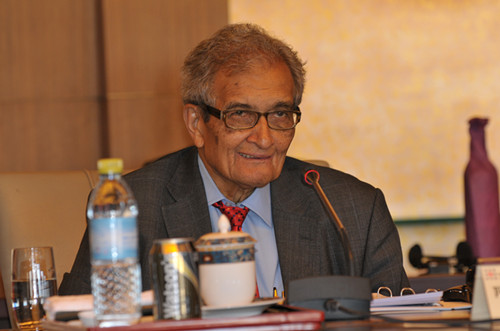
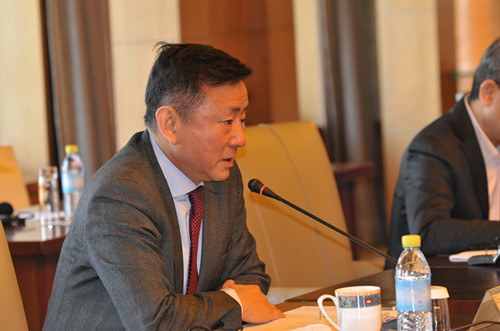
Chinese Economists 50 Forum: Seminar on ‘Economic Growth and Equality’
Fan Gang: We are so thrilled that Professor Sen could visit us and have this opportunity for exchange. I will first to introduce my colleagues and our Forum, and then Mr. James Rothschild will introduce the visiting delegation. The Chinese Economists 50 Forum is neither a very tight organisation nor a very loose one; it is a kind of forum and mechanism for discussing policy, and we have exactly 50 members. Many of them have academic positions, many hold government positions, like the Governor of the Central Bank, and the Minister of Finance. The Forum’s main focus is on addressing China’s economic development, social development, and associated issues related to public policies. We gather from time to time, mainly for closed-door internal discussions to discuss policy making. We also have annual meetings which are more public, and open to the media and other experts. We have been going for over twenty years. We also hold occasional public events, such as the one at which Professor Sen will be speaking at Tsinghua University this afternoon; a public forum for the general public, students, and media.
This morning I am joined by four Chinese Economists 50 Forum colleagues. (i) Professor Li Shi, professor at Peking Normal University, expert on income distribution, who has worked on policy formation and who has had association with Oxford University and other international institutions. (ii) Professor Bai Chongen, professor at Tsinghua University. Professor Bai graduated from Harvard and is working on many issues including growth, financial development, and also social issues. (iii) Professor Cao Yuanzheng. Previously a professor, in recent years he has worked as the Chief Economist at the Bank of China. Professor Cao is very active on policy debates and he has been involved in designing many of the key reform policies in the past 20 to 30 years. Professor Cao is a longstanding member of the Economic Committee and Economic Reform Committee. (iv) Mr. Zhou is a financier and investor, representing the young generation of Chinese investors. He is very actively not only in China but also internationally. (v) Finally, myself. I am a professor at Peking University and also chair two research institutes: one in Beijing, the National Economic Research Institute, and another in Shenzhen, the China Development Institute, which has recently been included as one of the State’s officially approved and high ranking think tanks. This is a very Chinese concept: a think tank which cooperates with the government. I am working on macroeconomic issues, policies and also development issues, and I teach economic development at Peking University. That is us; over to Mr Rothschild to introduce your delegation.

James Rothschild: Thank you very much Professor Fan. It is a real privilege to be here, and may I say thank you for being gracious to give us the beautiful view out of the window today. My name is James Rothschild. I am the Director of U.S. and Asian investments for RIT Capital Partners, and Founding Partner of Highbrooke Partners through which I represent my family’s business interests in China. I would like to thank the Chinese Economists 50 Forum for putting this together and in particular you, Fan Gang, and Madam Xu, for your instrumental roles in making today happen. Needless to say it will be a fascinating discussion between Professor Sen and this esteemed group of economists. So without further ado, I will introduce the people on this side. (i) Professor Sen is a Noble Prize-winning economist at Harvard University, a leading global expert on a range of economic issues; he wrote the Human Development Report for the United Nations Development Program and served as economic consultant to the previous Secretary General of the United Nations- Boutros Boutros-Ghali. Over the past five decades, Professor Sen has committed himself to welfare economics, social choice theory, economic and social justice, economic theories of famines and indexes to measure well-being of citizens of developing countries. Prior to his current role at Harvard, Professor Sen held positions at the University of Oxford, Cambridge, the London School of Economics, the University of Delhi and the University of Calcutta. He enjoys a great relationship with China and concern for China’s development and is the Chairman of the International Advisory Board of the Centre for Economic and Human Development at Peking University. Just yesterday he was given another honorary professorship at Peking University. (ii) John Makinson CBE is the Chairman of the world’s largest publishing house, Penguin Random House. Previously Managing Director of the Financial Times, Chairman of the Institute for Public Policy Research, the UK’s leading progressive think tank, he is also Chairman of the National Theatre and Director of the International Rescue Committee. (iii) Cherie Nursalim is Vice Chairman of Giti Group, an international conglomerate with diversified interests in real estate, manufacturing, retail and natural resources, and founding member of the Global Philanthropic Circle. She has been appointed to the Executive Board of the United Nations’ International Chamber of Commerce and holds a number of roles with academic institutions including Columbia University, MIT and Yale, enjoys strong connections with China, is a philanthropic supporter of Chinese education and has been awarded the Baiyulan Award by the Shanghai government. (iv) Maxim Parr is Chief Executive and founder of Atlas Capital Group, and founding partner, with me, of Highbrooke Partners. Mr Parr is the strategic advisor to me and my family’s business interests in China, helping us to source and pursue opportunities here. His company is chaired by Simon Robey, one of London’s leading investment bankers and has worked with the world’s largest firms on their interests in China.
Fan Gang: Thank you very much. We shall proceed as follows. We will ask Professor Sen to give an opening speech, and look forward to hearing his thoughts and suggestions on Chinese public policy, and his concerns about Chinese development and social policies. We are highly interested in what he thinks of the global situation including income disparity and social development. We are really interested. Then we will open the floor. First of all I will ask our Chinese colleagues to respond and to share their thoughts, and will then welcome others to join the discussion. We have almost two hours, plenty of time for the exchange. Thank you.
Professor Sen: First of all, I would like to say how grateful and honoured I am to be here today and to interact with macro economists in China. I may begin by saying how China came into my work, where it has stayed for a very long time. I have been coming to this country regularly from 1983, nearly once a year. Even before that China featured in my work. China has an extraordinarily rich history and culture, and has contributed enormously to global civilisation. In my student days Mao Zedong was a big figure in any discussion. What was happening in China was a matter of tremendous importance for us. I am particularly interested in what China tells us about the world. So if certain things turn out to be problematic in Chinese economic development, it affects my thinking not only about China but also about the world.
My interest in Chinese policies goes back some way. I wrote about the Great Leap Forward, the Chinese famine and the Cultural Revolution. I think these policy experiments have taught China and the world a great deal. Also of interest were the differing experiences of change in China and in the Soviet Union, the largest countries of an anti-market kind. The Soviet model consisted of getting rid of all the institutions they had immediately and hoping they would be replaced; the idea being that if there was a case for the institutions to come, they would come. But institutions are not built that way. There is a history to it. I was absolutely alarmed about what was going on in Soviet Union. We had a massive downfall in Soviet Union from which of course Russia emerged. It caused enormous suffering. If you look at the mortality rate in Russia over the Perestroika period, it went from being equivalent to a low-end European country to the same level as Pakistan. It was a dramatic catastrophe. The Chinese did not go that way. The institution reformed gradually, new institution came in, and the market was encouraged. The state institutions were not abolished one fine morning. There is much to be learned from that, for those of us who like thinking about economic theory, and Marxist economic theory. China pursued a system which combined a reliance on the market economy, making good use of world trade and globalisation, and at the same time committed to provide education and healthcare to everyone. On the health side, the Chinese vacillated a bit. By 2012 more than 95% of the Chinese population was covered by healthcare. It is this combination of making use of the market opportunity by creating human capability through education and healthcare. Adam Smith talked a great deal about this. It helped China to become a great success. In 1995 Chinese GDP was about 2% of the world’s GDP; now it is about 12%. This is a gigantic increase.
I do not see a radical problem confronting China because I think the basic model has worked very well. And it can, in my judgment, continue to work, making use of these two things, not letting go of globalisation and not let go of continually improving human capability. Regarding the latter, if you contrast with my own country, India, the difference is huge. India is trying to encourage companies to ‘Make in India’ However, without an educated labour force, without good healthcare - Indian workers are ill one day ten – it will not work. This is one of the reasons why China has been able to produce almost any commodity whereas India is only able to produce commodities at the highest end, such as IT, certain auto parts or pharmaceuticals. The skill in India at the top end is quite large, and they can run, run Google, Microsoft, Deutsche Bank but basic skill of the population is very low, extraordinarily low. Almost everything in my pocket is made in China. The question in India is why is that not possible? That is the point Adam Smith was making. If you can read and write, are well trained, self- confident, and can follow instruction, you can do many things. Smith also raised the question whether that is a good life, if you are doing the same thing again and again, and that is a good question, but industrially China is a world-beater and thanks to this economic progress the Chinese in time will start to think about how to make life more exciting. We expect great leadership from China on that.
So if that is the story, which way do I see China proceeding? I do not see any reason for China slackening the market interest. The Chinese response to the 2008 slump was better than the European response which was counterproductive. The Chinese managed it better than any country in the world, and without making a song and dance about it. It was pragmatic thinking from economists like yourselves. Now there is no question that there are some major problems to be addressed in China. I do not regard them as road blocks but as stages of development through which one has to move. China has too high a proportion of the population in the rural sector and needs to reduce the labour force and in so doing raise labour productivity because fewer things will need to be made by hand.
In India there is a long tradition of valuing education. Buddha wanted enlightenment. Chinese scholars used to visit university in Bengal to learn Sanskrit. Indian scholars came to China.
If you look at what is going on in China now, I think the basic level of education, the basic level of nutritional arrangement, seems to be in place. I have a particular fondness for the China Development Research Foundation, of Lu Mai, whom I visited yesterday and saw how they monitor what school children are eating across China, and particularly in the west part of China where nutrition is still a challenge. China contrasts favourably with many countries including my own.
Education is really important and the Chinese level of education has to be enhanced not only in school level, which has already happened, but at university level. Now already China has some very distinguished universities, such as Peking, Tsinghua, Shanghai and so on. So in these respects I feel that the Chinese have lessons to offer not only to themselves, but to the whole world.
Despite its ups and downs, the relationship between China and India has been hugely productive for both sides. In the 8th century, the head of Chinese Board of Astronomy was Indian. This shows China is not insular.
I think the concerns that I have, which are certainly not meant to be criticisms, are threefold, and I will air them now as I have the ear of some of the finest economists in China. One of them is the Chinese in understanding that human capability is really important have achieved it through public services in a dramatic way, but have they made as much use of the fact that China now has much higher income than many other countries? China has been much more successful than say Thailand in raising it. Thailand’s life expectancy: 78, China: 77. About the same. Where is the impact of higher income? Infant mortality; China: 11, Thailand: 11. Child mortality; China: 13, Thailand: 13. Maternal mortality; China: 1.7, Thailand: 1.4. I believe that living standards increase with public services, as we have seen in Singapore, Korea, America, Europe and elsewhere. Is China getting as much as one could have expected it to?
Secondly, I am concerned about China’s over-reliance on nuclear energy. I know the French have done this and have convinced themselves nothing can go wrong on that. But Fukushima shows the risks. And there is a real risk of saboteurs blowing up a nuclear power station, a greater risk in India. If instead of the Taj Hotel bomb in Mumbai, they had blown up a nuclear power station, it would not have been 170 people killed; it would have been a million. The Chinese did some really major work on solar energy. In fact, it is not often recognised that solar energy cheapened in India because of the Chinese governmental support for the solar power industry. In one year the cost in India of solar energy fell by 50% as a result of Chinese governmental investment. I would like Chinese to think a bit more about solar and a bit less about nuclear.
The third issue is one of the things that one finds dramatically different between China and many countries in Asia, particularly of west of here, is the position of women. Now the position of women have dramatically raised in China has achieved big things. I recently wrote an article in the New York Times explaining that the main reason for China’s falling fertility rate is not the One Child policy but women’s education. In women’s gainful employment and education, for which China is a world leader increased the voice of young women. By increasing the voice of young women, the Chinese have been able to cut the fertility rate. My question is despite this progress, why does boy preference persist? Everywhere in the world, about 95 girls are born to every 100 boys. That is a biological fact. That is the kind of ratio you find in Europe and America. The Chinese ratio is not 95 but 84.7, really low, even lower than India which is 92.6. So in this respect China is doing worse than India. Why so? The Koreans have cut down their boy preference a lot, and it is around 91 now. Women’s education and empowerment has reduced the fertility rate and reduced gender discrimination. You do not see any sign of girls being treated worse than boys once they are born. But before they are born, why? Now does it have any impact on economic development? I do not know. But if my theory is correct, the economic and social development integrally related, one has to wonder whether there is not a cost here.
So these are the concerns I am raising. None of these are catastrophic problems but they are important things to think about and having got the ear of the finest economists in China, I would be mistaken if I did not air my concerns. I would say my optimism about China and I believe China will find its way to solve the problems. I see China’s success as a global success. A negative story coming out of China is a matter of great concern to us all. China has taught us so much and I have greatly enjoyed studying it since the age of 14. Thank you very much.
Fan Gang: Thank you so much for this very wide range of topics and your insight on all those issues you, all very relevant to what is going on in China and relevant to topics on which we are conducting research. Let us now respond to Professor Sen’s questions and topics presented.
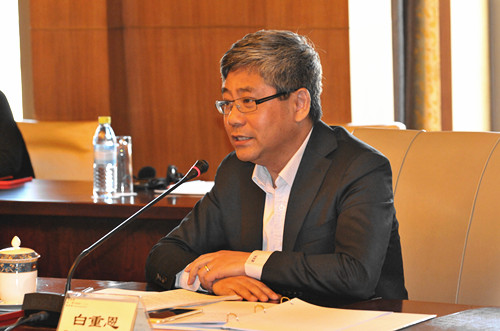
Bai Chongen: Thank you very much. I am very interested in your discussion comparing the Soviet experience with China and with India and I agree with a lot of what you said. You said that in the Russian experience, they abandoned all the existing institutions hoping that new institutions would emerge automatically. By contrast China adopted a sort of transitional institutional development. My understanding of the Chinese experience is that in addition to those roles played by the government in improving education and health, the government also played other roles. We can argue whether those roles are productive or counter-productive. My suggestion is that market institutions are very slow to form. As you suggested in the Russian experience, when you get rid of old institutions, it takes a long time for new institutions to emerge. The same is also true in China. We do not have a lot of the market institutions that make market work well. So when the market institutions are not there, and it becomes very costly, there are a lot of obstacles for firms, for enterprises to function well. One indicator we can look at is the World Bank Doing Business Indicators. There China does not do well at all. We rank about right in the middle, 90th among 180. That means our market institutions, at least formal institutions, are not that good. But somehow buildings are built even though it takes three and a half years to get a construction permit. Obviously a lot of enterprises find other ways to get it done. So those ‘other ways’ are an interesting phenomena. The formal institutions are poor but somehow these enterprise find informal substitute for the formal institutions. In the process we have all kinds of problems. Now everybody has the access to the informal institutions and you have unequal opportunities, and also corruption in the process. So we find convenient ways to get around the obstacles but those convenient ways may trap you. It is too convenient so you do not work hard enough to create the high-quality formal institutions that reduce the cost of production. So that is one concern I have in addition to the three concerns you mentioned. Is it automatic that the gradualist approach to institutional reform will reach the final goal or somehow in the middle we are stuck somewhere because we took the convenient approach. That convenient approach does not solve some of the fundamental problems. Right now I do not think we have an answer to that question. We face uncertainty.
The three concerns you mentioned are really important. I have not studied those issues very carefully, but I would offer some speculations about the first issue. You mentioned China has higher income than Thailand but in those indicators related to health and others China is not doing better than Thailand. But another potentially very important factor is the environment. We have higher income than Thailand, but our air quality is probably poorer than that in Thailand. Our water quality is probably poorer than that in Thailand. And we may have more toxins in the soil so the food grown from the soil may have lower quality than Thailand. So that is the cost of fast development and it is not just about making healthcare available to the rural area. As you mentioned, we have achieved a lot of things since early 2008 in providing universal coverage of health insurance and the quality. We have spent a lot of resources to increase the capabilities of rural clinics. We spent a lot of money but I do not know how effective that kind of spending is. I think in additional to these healthcare issues, the environmental aspect is a very important factor.
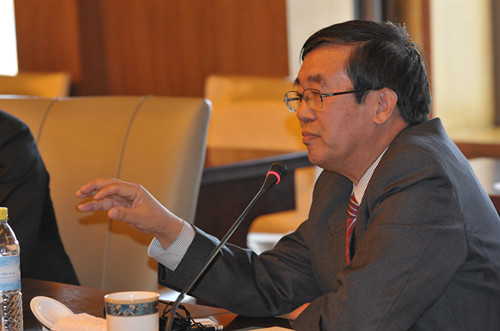
Li Shi: Thank you Professor Sen for your talk. If you want to look at China usually you like to compare China with India and China with other developing countries at the same income level. If you look at HDI, in each indicator China is much better than India. However, if you look at China with the division between urban and rural areas, you will find a big gap between rural and urban area. For instance education: I think on average, education development is China is better than in India, but if you look at education levels between urban China and rural of China, there is a big difference. In the last ten years, education has improved in rural areas, but the quality gap between rural and urban has grown. Some figures indicated that for the new entries to the top universities, the proportion of the students coming from rural areas have been decreasing. That means when we compare China with other countries, it is misleading not to factor in the urban-rural divide. I would like to see the difference between rural China and rural India, which I think would be quite similar.
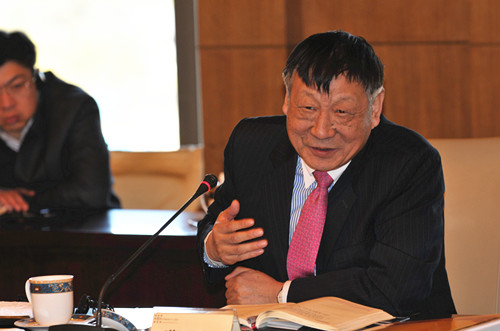
Cao Yuanzheng: Thank you Professor Sen. In your presentation, you compare China, Russia, India and Thailand, and your idea is that public service is the very important preconditions for development. That means the government functions are very important, but you also suggest for this economy that it introduces the market economy. So there is a contradiction between the market function and the government functions. How do we deal with that? The second question is how to deal with the local vs central? From my understanding, you can see different countries’ ways to deal with that are totally different. In Russia, it is the federation and maybe in India something similar; but in China the central government has more power. Maybe that is why it is better able to provide public services than India and Russia. But this is still an open question, and I would like to hear your thoughts on this.
Fan Gang: I have two reflections. Regarding institutional change, Russia wanted to stop everything immediately, and try to establish things afresh. But this has not worked. The system has struggled with organised crime and corruption. Recently the Russian government started an anti-corruption movement as Chinese is doing. In China there is a slow process of building up the formal institutions but people still do the business in the informal ways as Professor Bai said. But when corruption becomes so serious, the authority launch anti-corruption processes. The problem then is it this makes government so slow. All the convenient ways become inconvenient because no one can get things done. I think when we think of the process of the institutional building, the rule of law, the legal system and the real practice of the real business in the western countries, I would argue a similar process took place. You need the problems to be reviewed case by case, and dealt with, and then the institutions become built on solid ground with agreement among the participants of the institution. So from that point of view, I would say both China and Russia are halfway. There is still a long way to go in this institutional building. The history of China has been a new dynasty, then corruption, then rebellion, then a new dynasty, and so on. How to break this down is really the issue. How to build formal institutions which can properly disrupt this pattern and start a new pattern is really the issue. I think we are working on the issue with the anti-corruption campaign. So no matter that lot of people say this anti-corruption is political, it has really played a role in breaking down some old practices and made people think about new ways, better ways and the rule of law. From that point of view, I am not too pessimistic. I think what is happening is going in the right direction.
The second issue is about public service. It is true there is a great number of people without access to good public services. The urban-rural divide is great, and there is a third category of people in between: migrant workers shifting between the urban and rural areas. They cannot enjoy public services as urban citizens, but they are working in the urban areas. They get some education in the rural areas and then when they move to the city, the process of learning stops. They change jobs frequently. They are insecure and do not have long-term plans for their career, so they do not invest in learning and may not really participate in training programs. Companies do not like to provide training for them because they move job so frequently and are still not settled. The good part is these migrant workers have the insurance of their rural assets, the land, the house, and education for their children in the rural area. If they lose their job, they can return and will have a sort of social security. So we do not have the phenomenon of urban slaves.
I do not think the ‘Hukou’ can be abolished quickly. You have to go through a gradual process of increasing public services for migrant workers in urban areas. I think that is one of the fundamental problems that China is facing. A lot of migrant workers say the one public service they need is education for their children. They say, ‘As long as my kids can go to school in the city where I live, I am happy to stay in the urban area’. The government has started to work on this, it realises the problem; but changes are very slow.
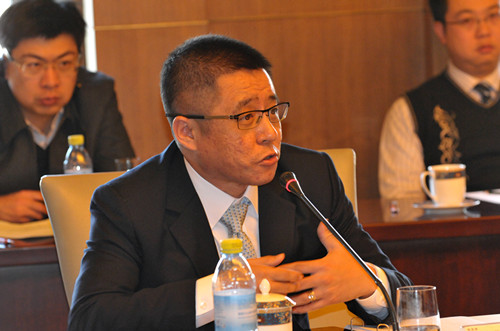
Mr. Zhou: First of all, I am not an economist and I am not a scholar. So I will just share my personal experience. Overall I am very optimistic about China. Poverty is still an issue. We still have some educational problems. Beyond that, I agree with Dr Fan Gang that institutional building is a long process, and in the meantime, institutional building calls for policy change. It has to change gradually. From the business side, we also call for deregulation and consistent policies because right now doing business in the right way and in the ‘easy way’ can be equally costly. A policy in Beijing may not be effective in Shenzhen and may not even work in Shenzhen. From the business perspective, of course I call for deregulation. But at the same time I know there is a long way to go because institutional building simply takes more time.

Maxim Parr: May I take this opportunity to briefly say thank you so much to everyone for participating in. I’m learning so much from this exchange. Thank you Dr Fan. I would like to put forward a question which Professor Sen and I discussed earlier today, around understanding the definition of what exactly the ‘middle income trap’ is. If our understanding is correct, the so-called trap does not necessarily seem to apply to China at this current state and relative to countries which are more conventionally associated with the notion of this trap. So my question would be if we can perhaps at some point discuss what that means and how that is thought about in a China context.
Cherie Nursalim: I like the optimism of this exchange. I was recently involved in the B20 taskforce and the theme was very much on green finance – I am pleased that China is taking the lead on this. From a business perspective, I support the anti-corruption initiatives. My experiences in Singapore, Malaysia China and elsewhere in the region have led me to understand the importance of clean government. I have seen positive developments in Indonesia. Another reason for optimism is China’s high level of training for officials. We have worked a lot with Tsinghua University to help train officials from different parts of China. I think there are some best practices to be learned here, from Singapore, from Indonesia, and I am sure, from India too.
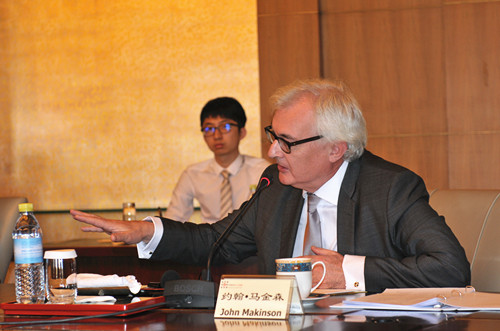
John Makinson: I had a general question on the issue of balance between market and public institutions which has been a feature of the conversation. I wonder whether the development of these market institutions is being inhibited by the very strength, reach and resilience of the government institutions. I mean that in a complimentary sense in that the Chinese leadership is probably the most educated in the history of the world. The reason that market institutions have flourished in the way they have in the United States is that except in the area of regulation the government is largely absent from a process. And one could argue in the context of India that the technology sector has flourished because it had to create the capacity itself to train the people, to build the roads to its own offices because government would not provide that support. I would be interested in your observations on this.
Professor Sen: This has been a very exciting discussion. As China becomes one of the rich countries in the world, the question of what is a good life will become a bigger question. The rich in China have always had the chance to think about these issues. On a practical level, a number of good points have been made. Professor Bai was right in saying the government has a crucial role in improving the environment.
Sometimes there is a fine balance between the role of government as against the market. What saved the telephone sector in India, for example, was that the Indian government did not class it as a ‘vitally important’ sector and therefore dynamic private companies took the initiative. And anti-competition authorities can be a strong force for good. But clearly there is a lot that the market cannot do, such as railway infrastructure.
I am very impressed by the Chinese education system. I am awed by the extent to which students come out well-trained. We get a great flow of Chinese students at Harvard, MIT, Berkeley and others, and thank god for that. But I think there should be a flow from America to China too as China has much to share, especially in business.
As for comparing Russia’s and China’s experience, Russia’s mistake in the wake of the Soviet Union’s collapse was to assume the market would rise because there was a need for it. China was right not to do this.
[Coffee break]
Fan Gang: Welcome back. I would like to encourage our Chinese colleagues to make some further remarks and reflections in the remaining time, followed by an open discussion.
Bai Chongen: I would like to address John Makinson’s question about the relationship between market institutions and the role of the government or the informal institutions that are dominated by the government. I think there is no one answer. On the one hand, the informal institutions which are centred around government power did play a positive role in promoting economic development, because the formal institutions were not there, so convenient ways did help. Also, the demand and the supply for good market institutions actually depends somewhat on the level of economic development. When you have these convenient ways to promote growth, they actually help create a stronger demand for better market institutions. They also help to supply better market institutions. I would like to take as an example the development of the internet. In China our retail business pre-internet was really bad. It was strongly dominated by some monopolists and regulation was very problematic, but the development of the internet helped solve a lot of problems. This development of the internet is a function of economic development. When convenient ways help to develop the economy, it helps to create better market institutions. On the other hand, there is also the obstacle created by these informal institutions to the development of market institutions. For example, when the government designates an area as ‘vitally important’ sector, the government makes investment in it, the government has subsidy policies for the sector, but there are examples in which the government’s intervention actually distorts incentives for private business and a good industry could have developed without government intervention. I would use the example of the solar panel industry where the government did intervene a lot and it created a lot of problems - although that helped reduce the cost of solar panel for other parts the world - but from Chinese manufacturers’ point of view, it was a very bad situation, as it created a lot of over-capacity.
John Makinson: In my role as a book publisher I see both sides of that coin. It is much easier to sell books in China than it used to be through the inefficient retailing book stores, which has been replaced by a very healthy online book retailing economy. On the other hand it is quite hard to publish books in China because there is not fair play playing field between foreign publishers and domestic publishers as a result of the approach the government takes to publishing. So I see it both ways.
Bai Chongen: Regarding the middle income trap, my understanding of this issue is related to our main discussion about institutions. We have been so reliant on government measures in developing the economy and when those measures are taken to the extreme and do not help any more then you need other ways to develop the economy. If these other ways do not help and the market institutions do not develop, you can be trapped there. That is my understanding of the middle income trap in China’s context. For example, since 2008, if you look at the structure of investment and if we break down investment into three parts: machinery; residential buildings and structure; and non-residential buildings and structure. The share of investment going into non-residential buildings and structure went up very much. It used to be 38% in 2008, now it stands at 50%. So a lot of non-residential buildings and structure investment was driven by government initiatives - building roads, building railways, building ports, etc. So these investments did help very much in the initial state of the investment because you need roads, you need the railways and you need the ports. But when you build too much, too fast, that is a problem. So now we have over-capacity in a lot of areas and most of the over-capacity is related to construction (steel, cement, glass and alumina). That was because the government demand and government investment in infrastructure created a lot of demand for these construction materials. But now because of a lot of reasons the demand is weakened and is not there anymore. So you have over-capacity in these areas. That pattern of growth cannot go on forever, you cannot just build roads and ports; you need to build other things. Our government and our economic system is actually very good in building roads, but can we do equally well in building other stuff? We are doing other stuff as well, but can we do other stuff as well as we build roads? That is the issue and that is why we worry about the middle income trap. We need to change the pattern of growth and we need to change the pattern of investment.
Li Shi: Let me talk about middle income trap. I believe this concept is important. When the Chinese recognised this concept was relevant for the Chinese economy was five years ago when Xi Jinping had a meeting with the head of ADB. China is concerned about the middle income trap it is a middle income country and if you look at other countries over the past three decades, you find some middle income countries had long-term stagnations in their economies, like Brazil, Argentina, Mexico and South Africa, with a growth rate of less than 1% for more than 20 years. There are three main problems associated with the middle income trap. First, large income inequality; secondly, absence of innovation; and thirdly the lack of development in higher education. China currently suffers from all three.
Cao Yuanzheng: I want to make some comments about institutional change. In my understanding from my time at the National Committee of Economic Reform, we understand the importance of gradual institutional change from a planned economy to a market economy. Just as Fan Gang has mentioned, in the Soviet Union, institutions were destroyed too quickly. In China, we preferred gradual change and it has largely been a success. Also, competition between provinces has helped China to develop its system gradually. Moreover, just as Fan Gang said, we need some change and we need to redefine some government functions. China is trying to change the government functions from a ‘construction government’ into a ‘public service government’.
Fan Gang: Unfortunately we have nearly run out of time, which goes to show that despite having just a few economists around the table, we still run over time. I would just like to contribute my thoughts about the middle income trap and give Professor Sen a final five minutes. I think the common definition of the middle income trap is not correct. The standard definition is that middle income countries are not able to compete with high income countries yet they are not yet equipped with high-tech innovation and are therefore stuck in the middle. I call this a ‘technology’ definition of the middle income trap. No country can just come out of the league of poor countries and have the ability to compete with high income countries. There are a lot of technologies which are neither defined as low technology nor high technology, rather are in the middle. Countries like South Korea have been working on this ‘middle’ technology for a long time and they continue to grow. So I do not agree this is a problem.
I would argue that the middle income trap is somehow related to middle income itself. In the middle income stage, income disparity is the highest, which causes the problem. I would argue that the bottom point of Kuznets curve actually reflects the Lewis turning point because before the Lewis turning point the income gap becomes larger and larger, and afterwards, because wages catch up, the income gap is less and less. So from that point of view, the middle income trap is actually the income disparity trap, which explains other countries’ situation. Some Latin American countries are trapped because of income disparity or because of social and political problem such as turmoil and political changes. Or they have a problem of income distribution, fiscal debt, or international debt because of overspending on social welfare because of populism. So from that point of view, this is very subtle situation any developing country at this stage has to face. And then there is the issue of middle income itself. When Britain had an income of 5,000 USD per capita, 100 years ago, that was not middle income because that was the highest income in the world then.
Professor Sen: So many interesting points have been made. I cannot possibly follow all of them. I can see why people talk about the middle income trap even though I believe there is no such thing. If you look at the middle income trap, there is a kind of mythical idea that if you go up and up, you suddenly get stuck in a trap. It is not at all clear why this should happen. If you look at the history of the world, there is no evidence of any middle income trap. If you think of the world, first of all Europe and America went through a middle income phase. But if you look at the countries which came later like Japan, Korea and Singapore, I do not think that there has been any problem at all. I think people have picked up a particularly problematic economy like Brazil or Mexico, but these countries have suffered in unique ways, such as the drug lord problem in Mexico. These are not middle income traps, but specific countries struggling with specific problems. We should forget the middle income trap and instead identify individual problems and find solutions to those problems. If there was a middle income trap, it would be bad news not only for China but also terrible news for the world. I am delighted that my sense of optimism is affirmed rather than diminished by this morning’s discussion. Thank you very much.
 Copyright © Chinese Economists 50 Forum ICP No. 13006527
Copyright © Chinese Economists 50 Forum ICP No. 13006527